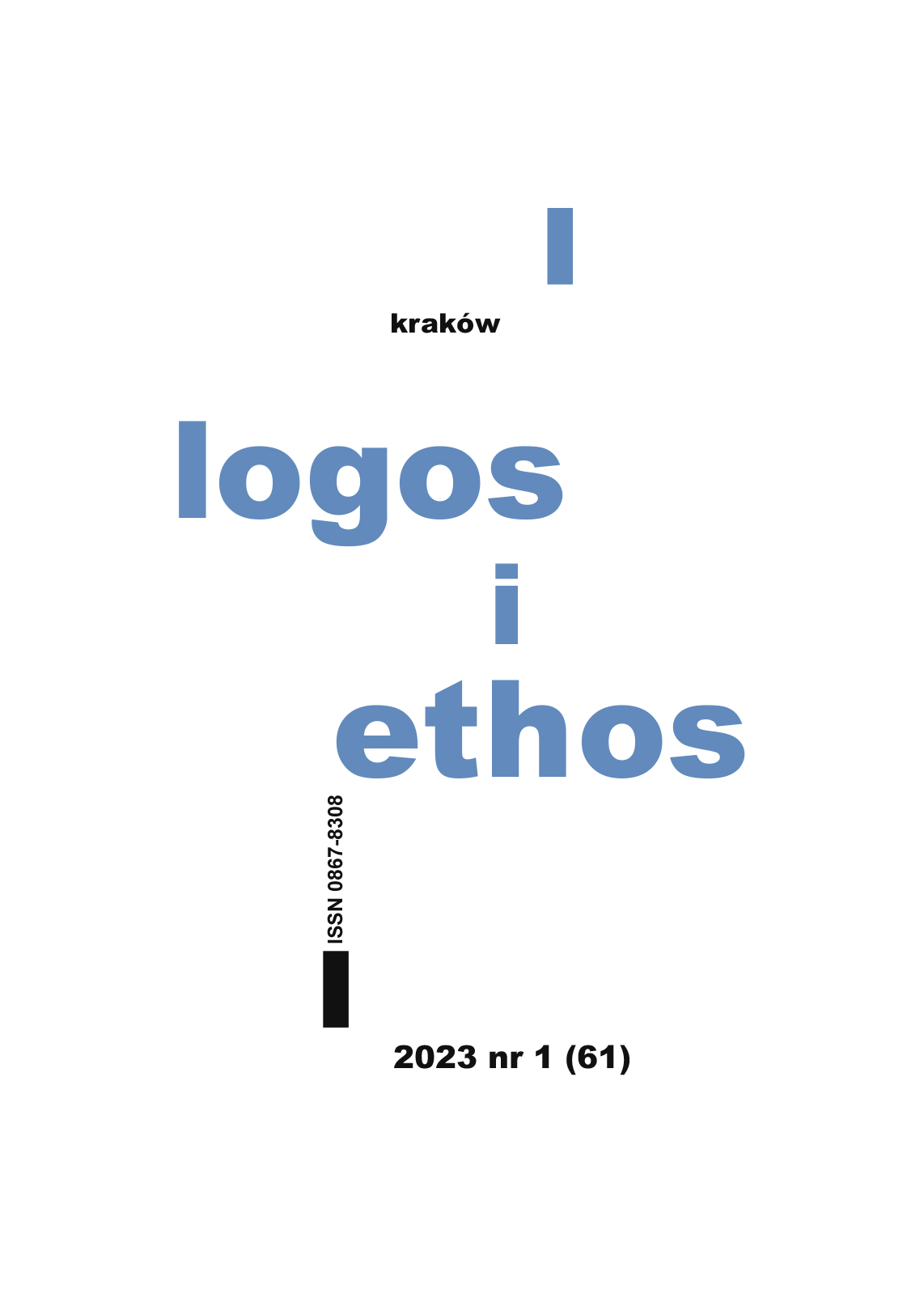The problem of personalism in Karol Wojtyła’s debate with Max Scheler
DOI:
https://doi.org/10.15633/lie.61105Słowa kluczowe:
etyka, Karol Wojtyła, Max Scheler, personalizm, osoba ludzka, obiektywizm, zasada realizmu, emocjonalizm, postmodernizm, neuroetykaAbstrakt
Artykuł wykazuje, że już w pracy habilitacyjnej poświęconej etyce Maksa Schelera Karol Wojtyła bronił konsekwentnego personalizmu etycznego, wypaczonego przez niemieckiego fenomenologa. Trafne wiązanie wartości moralnych z nadrzędną, ponadinstrumentalną wartością osoby ludzkiej, wiązało się jednak z jej subiektywizacją, w wyniku czego roszczenia Schelera do obiektywizmu etycznego są bezpodstawne. Oprócz tego całkowicie bezpodstawnie uznał spontaniczną emocjonalność za centrum osoby, gubiąc w ten sposób sprawczość osoby wobec wartości moralnych, czyli centralną rolę ludzkiego rozumu i wolnej woli w życiu moralnym, zaprzepaszczając w ten sposób moralną odpowiedzialność człowieka za swoje czyny. Ta diagnoza etyki Schelera ma znaczenie dla rozeznania we współczesnej posthumanistycznej etyce, która — idąc tropem Schelera — rolę kierowniczą w życiu moralnym przypisuje spontanicznym emocjom.
Bibliografia
Anscombe G. E. M., Modern Moral Philosophy, “Philosophy” 32 (1958), p. 169–194.
Aquinatis S. Thomae, Summa theologiae, cura et studio P. Caramello, Torino 1963.
Aristotle, The Nicomachean Ethics, transl. F. H. Peters, London 1906.
Bauman Z., Ciało i przemoc w obliczu ponowoczesności, Toruń 1995.
Bauman Z., Dwa szkice o moralności ponowoczesnej, Warszawa 1994.
Bauman Z., Etyka ponowoczesna, transl. J. Bauman, J. Tokarska-Bakir, Warszawa 1996.
Bauman Z., Moralne obowiązki, etyczne zasady, “Etyka” 27 (1994), p. 9–28.
Biesaga T., Karola Wojtyły krytyka koncepcji osoby Maxa Schelera, “Logos i Ethos” 47 (2018) nr 1, p. 181–197.
Churchland P. S., Moralność mózgu, transl. M. Hohol, N. Marek, Kraków 2013.
Czachorowski M., Mitologizacja moralności w posthumanistycznej etyce, “Człowiek w Kulturze” 32 (2022) part 1, p. 89–117.
Czachorowski M., Osoba a natura. Ujęcie Karola Wojtyły, in: Wokół antropologii Karola Wojtyły, eds. A. Maryniarczyk, P. Sulenta, T. Duma, Lublin 2016, p. 307–352.
Czachorowski M., Ponowoczesność jako moralny rozwój?, in: Społeczno-humanistyczna wizja współczesnego świata, ed. H. Czakowska, Bydgoszcz 2020, p. 11–25.
Gilson E., The Unity of Philosophical Experience, New York 1950.
Harari Y. N., Homo Deus. A Brief History of Tomorrow, London 2017.
Hołub G., Od antropologii do etyki postmodernistycznej: w stronę autentyczności czy dowolności?, in: W labiryncie wychowania. Wyzwania edukacyjne w ujęciu interdyscyplinarnym, eds. B. Stańkowski, M. Szpringer, Kraków 2013, p. 29–44.
Ingarden R., Wykłady z etyki, Warszawa 1989.
Pietrzykowski T., Etyczne problemy prawa, Katowice 2005.
Rorty R., Etyka bez powszechnych powinności, “Etyka” (1998) nr 31, p. 9–25.
Rorty R., Etyka zasad a etyka wrażliwości, “Teksty Drugie” (2002) 1–2, p. 51–63.
Scheler M., Der Formalismus in der Ethik und die Materiale Wertethik. Neuer Versuch der der Grundlegung eines ethischen Personalismus, Halle 1921.
Styczeń T., ABC etyki, Lublin 1981.
Waldstein M., Three Kinds of Personalism: Kant, Scheler and John Paul II, “Forum Teologiczne” 10 (2009), p. 151–171.
Wierzbicki A. M., Osoba i moralność. Personalizm w etyce Karola Wojtyły i Tadeusza Stycznia, Lublin 2021.
Wojtyła K., Człowiek w polu odpowiedzialności, Lublin–Rzym 1991.
Wojtyła K., Miłość i odpowiedzialność, Lublin 1986.
Wojtyła K., Ocena możliwości zbudowania etyki chrześcijańskiej przy założeniach systemu Maxa Schelera, Lublin 1959, reprinted in: K. Wojtyła, Zagadnienie podmiotu moralności, Lublin 1991, p. 11–128 (Człowiek i Moralność, 2).
Wojtyła K., Osoba i czyn, Kraków 1985.
Wojtyła K., Personalizm tomistyczny, in: K. Wojtyła. Aby Chrystus się nami posługiwał, Kraków 1979, p. 430–441.
Wojtyła K., Problem teorii moralności, ed. B. Bejze, Warszawa 1969, p. 217–249 (W Nurcie Zagadnień Posoborowych, 3).
Wojtyła K., System etyczny Maxa Schelera jako środek do opracowania etyki chrześcijańskiej, in: K. Wojtyła, Zagadnienie podmiotu moralności, Lublin 1991, p. 129–180 (Człowiek i Moralność, 2).
Woroniecki J., Katolicka etyka wychowawcza, t. 1–2, Lublin 1986.
Pobrania
Opublikowane
Numer
Dział
Licencja

Utwór dostępny jest na licencji Creative Commons Uznanie autorstwa 4.0 Międzynarodowe.
Autorzy publikujący w czasopiśmie udzielają jego wydawcy zgody o następującej treści:
- Autor zachowuje autorskie prawa majątkowe do utworu, a jednocześnie udziela wydawcy czasopisma zgody na jego pierwszą publikację w wersji drukowanej i wersji online na licencji Creative Commons Uznanie autorstwa 4.0 Międzynarodowe oraz zgody na wykonywanie opracowań, w tym przekładów.
- Autor ma możliwość udzielania zgody niewyłącznej na opublikowanie utworu w wersji, która ukazała się w czasopiśmie (np. zamieszczenia go w repozytorium instytucjonalnym lub opublikowania w książce), wraz z informacją o jego pierwszej publikacji w czasopiśmie.
- Autor może umieścić swój utwór online (np. w repozytorium instytucjonalnym lub na swojej stronie internetowej) jeszcze przed zgłoszeniem utworu do czasopisma.

